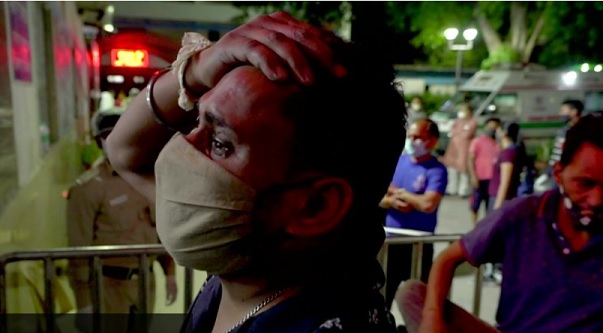
India has reported 314,835 new coronavirus cases in the last 24 hours - the highest one day tally recorded anywhere in the world.
Deaths rose by 2,104 in the same time period, India's worst daily toll.
It brings the country's total confirmed cases close to 16 million, second only to the US's 31.9 million.
India is in the grip of a vicious second wave and an acute oxygen shortage is raising more fears about its overwhelmed health care system.
It has led Delhi's highest court to publicly criticised the central government for its handling of the oxygen crisis in the city.
"This is ridiculous. We want to know what the centre is doing with regard to oxygen supply across India," the judges said while reading out the verdict in a petition by the owner of six private hospitals.
Meanwhile, authorities in the worst affected state of Maharashtra announced a series of additional restrictions starting from Thursday evening, as it battles a steep surge in cases.
It was already under partial lockdown from 14 April.
Maharashtra is India's richest state and home to its financial hub, Mumbai. It's also been a Covid hotspot since the start of the pandemic, accounting for a quarter of India's cases.
Maharashtra has also reported more deaths from the virus than any other state, with 67, 468. India has confirmed more than 180,000 deaths so far. Although deaths have been rising, the fatality rate remains relatively low.
India has seen a rapid rise in case numbers over the past month, driven by lax safety protocols, and a Hindu festival attended by millions and variants of the virus, including a "double mutant" strain. It was detected in 61% of samples tested in Maharashtra, according to the National Institute of Virology.
Huge election rallies - including by Prime Minister Narendra Modi - were also not halted in the state of West Bengal which has been going to polls in phases.
Voters will be out on Thursday as well, for the sixth stage of voting. The government has defended the decision to continue with the polling.
Critics have also pointed to the lagging vaccination drive in the country, which experts say needs to pick up quickly to contain the spread. India has so far administered more than 130 million doses, but the drive has so far been restricted to health workers, frontline staff and those above the age of 45 and anyone with comorbidities.
From 1 May, people above 18 will also be eligible for the vaccine. But a supply crunch, which is already affecting the drive, could slow it down further.

